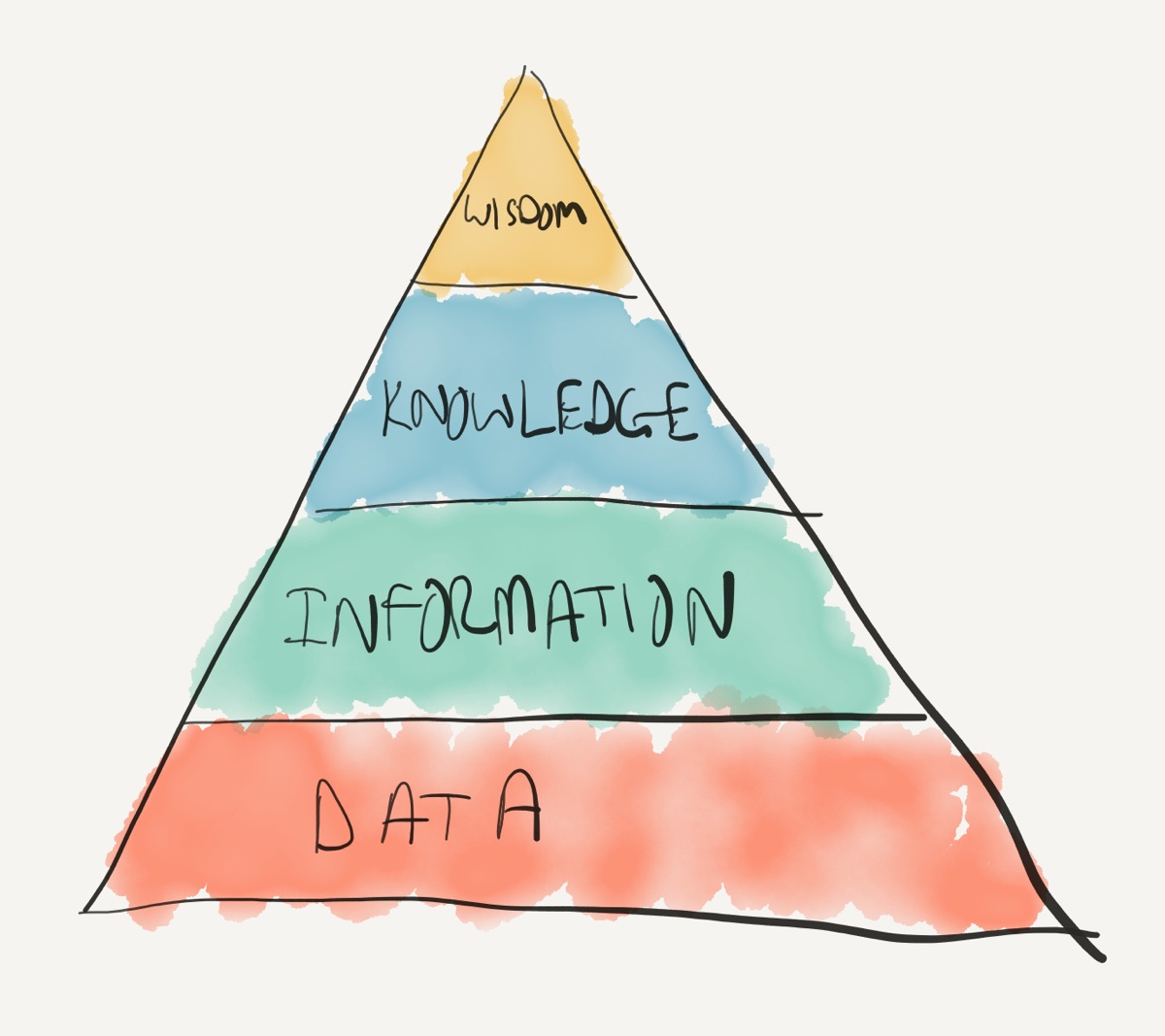There is essentially two ways to improve at your job. You either get better at the things you should be doing, or you learn to stop doing the things you shouldn’t be doing. We tend to spend a lot of time and effort on the first aspect—and for good reason. It’s absolutely essential to keep learning. But lately I’ve been consumed with that second part. Day in and day out, at the most inconvenient times, the same question jumped into my head:
What are the biggest mistakes I’ve been making as a product manager, and how do I stop doing those things?
I took some strange detours trying to answer that question. And in the end, the answer I came up with specifically for product management had its origin in an unlikely place: some graduate work I did almost two decades ago. So let’s take a quick detour into information science theory before we return to the matter at hand…
One of the first things you learn about knowledge management is what’s called the DIKW pyramid. It provides a model for thinking about the transformation of raw data into something more useful.

- Data refers to facts and observations. They are the spreadsheets and SQL query outputs that come across our desks on an almost daily basis.
- Information is inferred from data, and distinguishes itself from data in that it is actually useful for decisions or action. Company dashboards with business metrics like MAUs are information.
- Knowledge refers to a framework for decision-making based on information, i.e. “we believe that when this happens, we should do something about it”.
- Wisdom is illusive—both in definition and in… well, attaining it. I’ve always liked the definition that says wisdom is knowledge with judgment. Wisdom goes beyond having a framework for what to do, and describes having the judgment required to make the right decisions based on the information and knowledge available.
The model isn’t perfect, but it serves a valuable purpose. There are two aspects in particular that I’ve always found useful to remember.
First, to extract value from data it needs to be transformed into something more valuable, and you don’t get to skip phases. If, for example, you try to go straight from data to knowledge without first organizing the data as information, your knowledge isn’t going to be all that accurate.
Second, confusing one slice of the pyramid for another can be really dangerous. If, for example, you’ve been able to extract some knowledge from information, but you think you’re looking at wisdom, you’re going to make some bad decisions, because you haven’t taken the time to add the necessary judgment to the information in front of you.
With that as background, let’s get back to product management. If I think about the times when I’ve made my biggest mistakes as a product manager, it can all be traced back to one of two causes:
- I misidentified data, information, knowledge, or wisdom. For example, if someone on the team who is steeped in our product and its users comes forward with a wise suggestion about where to take the product next, and I jump in with a process to take what I think is some information they provided and turn it into knowledge, I’m operating at the wrong level. Turning information into knowledge is essential, of course (remember, you can’t skip steps). But trying to pull wisdom back to an earlier phase in the transformation process is disruptive and demoralizing. We shouldn’t do that.
- I communicated the wrong slice of the DIKW pyramid to the person or team I was speaking to. For example, let’s say a designer and I go through an extensive usability testing process on a prototype of a new feature. We collect data, we group that data into information, and then we discuss it to extract the knowledge and wisdom we need to make the appropriate changes to the product. The difficult part is knowing what to communicate to who. For some on the team, the end product (the “wisdom”) is good enough. Others, particularly those with good data transformation skills, might prefer to see all the information so that they can give feedback on the knowledge and wisdom we landed on. We need to know the difference of what’s needed by who, and share appropriately.
Knowing the mistakes you tend to make is only half the battle, though. So all of this led me to a statement I’m printing out and putting up above my desk, to help me avoid making those mistakes:
An effective product manager shepherds data from a variety of sources through the transformation of becoming information and knowledge and wisdom. They do so without getting bogged down in unnecessary process, and they only share the relevant parts that each person or team needs to make progress.
I’m sharing this here with the hope that it will resonate with some of you who may have been grappling with the same questions.
There’s one more important point I want to make. From my personal life I know the dangers of wallowing in introspection for too long, so I don’t intend to stay down here in mistakes-land. Wrestling with these questions was a helpful exercise, but it’s not a place I want to get stuck in. So I’m going to head out to that other place for now. You know, the one where we get to learn new things and improve our skills. Maybe we’ll see each other on the road.